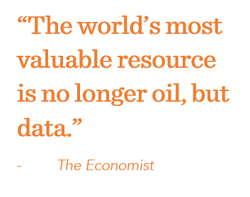 “The world’s most valuable resource is no longer oil, but data.” That’s what The Economist said in a fascinating opinion piece in 2017 that really stuck with me. This bold statement now seems more prescient than ever, as digital data continues to explode in volume and the advent of the cloud is significantly expanding where that valuable data, or electronically stored information (ESI), lives. So how has the legal world, and particularly all of us in the ediscovery realm, fared?
“The world’s most valuable resource is no longer oil, but data.” That’s what The Economist said in a fascinating opinion piece in 2017 that really stuck with me. This bold statement now seems more prescient than ever, as digital data continues to explode in volume and the advent of the cloud is significantly expanding where that valuable data, or electronically stored information (ESI), lives. So how has the legal world, and particularly all of us in the ediscovery realm, fared?
While this data revolution developed, lawyers, as per usual, have been a bit slow to adapt. As we’ve grappled with how to manage the explosion of data and cloud storage has gone mainstream, new and advanced SaaS solutions tied to cloud-based technology have taken the rest of the world by storm. It was only a matter of time before corporate clients would get on board and make the move to the cloud as is evident with the large majority of corporations who have transitioned to Office 365.
So as clients focus more and more on controlling their budgets and demanding more ediscovery efficiency, shifting to modernized, cloud-based SaaS technology seems like a no-brainer for law firms. What’s not to love about immediately eliminating the inefficiencies and manual tasks that accompany traditional ediscovery workflows and creating satisfied clients in the process?
In my previous two blogs, I discussed the top reasons why SaaS, self-service ediscovery is exactly the right solution and the way of the future for law firms, and also best practices for embracing the data revolution. In this blog, I wrap up my SaaS exploration and present the top things to consider when choosing the best and most versatile SaaS solution for your ediscovery program.

1. Quick to Onboard - Software in the ediscovery space has had a notoriously rocky road as far as simplicity and user friendliness. Many iterations of self-service, on-prem software are too complicated and require training fit for advanced users only. Another missing piece of the puzzle has often been the lack of clear and consumable metrics on areas like billing, usage, ingestion, and processing stats which are the key to helping inform users to make better decisions. With the new generation of ediscovery technology, lawyers and litigation support professionals would most benefit from choosing a SaaS, self-service tool that’s quick and easy to understand. Look for a tool where cases with multiple users can be easily managed across matters and locations, and where you can create, upload, and process matters quickly, all with a customizable reporting dashboard.
2. Access to Industry Leading Tools - One of the biggest issues we’ve seen as ediscovery software has evolved is the need for users of on-prem software to purchase, install, and maintain multiple tools and systems in order to have a comprehensive internal workflow that spans the EDRM. This is not only expensive, but time consuming and risky considering the security implications that come with holding client data on your own servers. With SaaS, it’s critical to choose a platform that will provide access to all of the industry leading tools from processing to analytics to production in one comprehensive tool that is purchased, maintained, and upgraded by the solution provider. Users will immediately see direct cost savings from not having to manage multiple systems themselves when they adopt this type of end-to-end SaaS solution.
3. Full-Service Support - Another important consideration when selecting a self-service, SaaS tool is to choose a flexible solution provider who can scale up if your matter changes and you end up needing full-service support. While having a self-service tool allows for complete independence in key areas like processing and production, what happens when your matter gets much bigger than anticipated and the data is too unwieldy to handle in-house, or if your internal team simply needs to shift their focus to something else? In this case, it’s critical to partner with a solution provider who has solid and experienced client support teams that can jump in any time you need help in your self-service journey.
4. Secure Infrastructure - Last but not least, in this age of data breaches and cybersecurity on the top of the list of concerns for law firms and corporate clients alike, make sure you fully vet any SaaS tool you’re considering by thoroughly researching the solution provider’s back-end infrastructure. Look for vendors who have a scalable architecture for data processing and automation that you’ll be able to take full advantage of while eliminating the overhead that comes with infrastructure development and management on your end. That infrastructure should come with the peace of mind of security certifications such as SOC 2 and ISO 27001. You can also eliminate the concern that often comes with the security of a public cloud by choosing a solution provider that hosts data within their own private cloud or within their own data centers.
Ultimately, as the global economy continues to shift from traditional commodities and lands squarely on data as its main driver, there’s a world of opportunity ahead for the legal world and ediscovery. With data already moved to the cloud for most companies and their focus shifted to reducing expenses and risk, ediscovery and SaaS for law firms is a perfect fit. If you have questions or want to share your experience with cloud-based SaaS ediscovery platforms, send me a note at SLedgerwood@lighthouseglobal.com or Twitter @sarahewood.
If you are interested in further exploring this topic, check out the below related content:
- Three Reasons Why Law Firms Should Adopt SaaS for eDiscovery
- Best Practices for Embracing the SaaS eDiscovery Revolution
- How to Bring eDiscovery In House from Seasoned Self-Service Adopters
- Overcoming Top Objections for Moving to a Self-Service eDiscovery Model
- Building a Business Case for Upgrading Your eDiscovery Self-Service Practices in Six Simple Steps
- The Truth Behind Self-Service Pricing in eDiscovery
